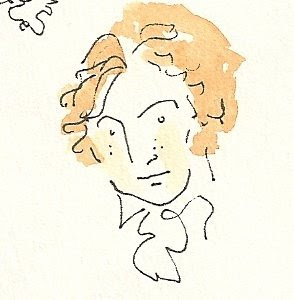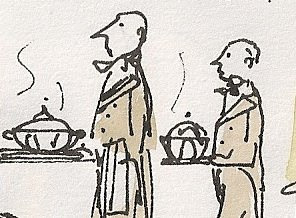 A cold pair of ones .....
A cold pair of ones ..... mercredi 18 février 2009
The Local Bigwigs in Joe-Pat's Townland
 A cold pair of ones .....
A cold pair of ones ..... Joe-Pat's illustrious descendancy
 Joe-Pat's illustrious and talented descendants .... Joe-Pat was not to know that the future held great things in store for him personally, the great turn his fortunes were to take which marked the end of his "wandering years". More of that later.
Joe-Pat's illustrious and talented descendants .... Joe-Pat was not to know that the future held great things in store for him personally, the great turn his fortunes were to take which marked the end of his "wandering years". More of that later.
mardi 17 février 2009
dimanche 1 février 2009
Little snowy white feet

Little Mary-Anne of the snowy white feet....
There was in the townland a young girl, a "colleen", by the name of Mary-Anne. Joe-Pat first saw her one evening at the side of the Crossroads observing with interest the dancing lessons. She was clearly too poor to pay the dancing master and as she stood in bare feet, her glossy black mane tumbling over a tattered red cloak. One day Joe-Pat offered to pay a sixpence for a lesson which she gently accepted. The next week however she came back to say that her family had told her not to accept money from men or strangers. She continued to come along every week to look on. Though the others took no notice of her, Joe-Pat was taken with her gracious manner. Never a word was uttered between them. One day, as autumn was approaching, she did not come. She was never seen or heard of again. Someone told Joe-Pat's mother that the familiy had moved away from their mud cabin and gone to Dublin. Strangely affected, he continued to carry the memory of her little face in his mind until years later, when a man, he made a most amazing discovery about her and her whereabouts. But more of that later.
Dancing at the crossraods ; Jigs and reels and cotilions
 Joe-Pat : his Mother's Pride ...
Joe-Pat : his Mother's Pride ... Protestants in the family; a secret source of pride

The strange likeness between Archie and Joe-Pat ...
Souper ; Protestant or Catholic? Take your pick.
+news.jpg) Mis-information along the Way...
Mis-information along the Way... dimanche 25 janvier 2009
The Hearth

Every Son has a mother...

Every son has a mother, and Joe-Pat was no exception ...
vendredi 16 janvier 2009
Bardic Tradition in Ireland
mardi 13 janvier 2009
Ireland History of
Anglo-Irish chroniques
 Vanity fair
Vanity fairThe night started off well enough. Ponsonby was not above consulting his valet on his appearance :
"Not too big? Still have my legs!"
"No! Perfect fit!" agreed the Lady of the house. "Yes, I think some would judge us a well-preserved couple..."
"Fine legs, Mashter!"
Ponsonby was proud of the new burgundy velvet jacket he had picked up that very day.
 A night out : It wasn’t much crack for everyone though … Mickey Deany fired the logs on like the blazes …. "Hell rub it up them …."
A night out : It wasn’t much crack for everyone though … Mickey Deany fired the logs on like the blazes …. "Hell rub it up them …."
mercredi 7 janvier 2009
Upright people ; learning morality in Ireland of the sixties

Disapproving aunties ... not in front of the childer!!!!
"Ten children! The irresponsibility of the man!"
"I don't know how she manages!"
"Aunti Ta, what's irresponsabully mean?"
"Never you mind, that's grown up's talk!"
















